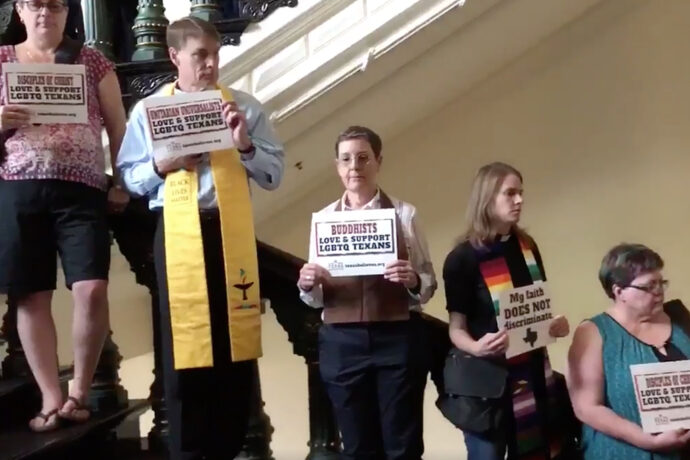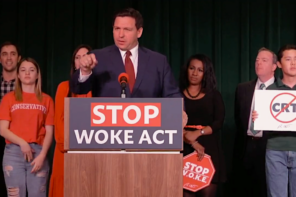Dear Texas Legislators,
The Lone Star State still holds a ten-gallon spot in my heart, but I am afraid that the warm, welcoming place I loved, the place that proved so crucially formative to my sense of self, will be lost forever if the cavalcade of anti-LGBT bills pending in the state legislature are enacted (see below). Because the way I see it, these pending laws are crooked as the Brazos.
I am a transgender queer Latinx, born and raised in Texas to a Mexican woman and Anglo man. And although I left the state at age 26 for graduate school—becoming the first in my family to earn a doctorate—I continue to call Texas home. My family still lives in your beautiful state, and each time I go home, I am reminded that: “You can take the person out of Texas, but you can’t take Texas out of the person.”
Aside from the very real hurt these laws would cause to me and to those most dear to me, they also betray our state’s proud tradition of welcome, codified in our one-word motto—“Friendship.”
I came to faith while living in Texas, came to understand myself as queer in Texas when I was quite young, and came to understand myself as transgender in Texas. Texas has generally welcomed my intersectional identities. Even in today’s polarized political environment, I know first-hand that Texans continue to strive to embody deep postures of welcome in all of the state’s many regions.
But if these anti-LGBT bills pass, Texas will fall victim to the fear-mongering and hostility that was elevated to the highest office in the country last November. I implore you to deeply consider the message these bills send—if not out of respect for our state’s political history of welcome, then at least with reverence to the many faith traditions in Texas that offer friendship and hospitality to the stranger.
As with many of you, I am sure, faith was a central piece of my upbringing. In Longview, I learned the value of welcome when the Baptist church down the road from my house had a bus ministry that picked me up every week for Sunday School and worship service. In San Antonio, I was reminded of the power of community when neighbors, loved ones, and strangers stopped by to see how we were doing—just because. And in college, I experienced welcome through a wide variety of student ministry programs. My teachers at Hardin-Simmons University taught me that my own pursuit of what is right stems from a deep-seated sense of awareness of difference.
When I was a young trans queer, I used to love visiting the Texas statehouse, with its statuesque building that I believed was filled with good people committed to making our beloved state better. I loved standing underneath the rotunda that was as round as the Texas sky is big. I enjoyed traversing the state—from Big Bend to the Panhandle—and, back then, did not know the fear that I do now when I think of returning to my roots.
When I was growing up, the state did not try to tell me where I could use the bathroom, nor did it tacitly endorse violence against me for being who I am called to be.
But with the Senate’s passage of SB 6 (the so-called “bathroom bill” modeled after North Carolina’s disastrous HB 2), you and your colleagues told me I should be forced into a restroom that doesn’t match my identity, making me vulnerable to violence and harassment. And if, God forbid, I find myself on the receiving end of a pair of frightened fists or worse, I will be legally defenseless, since you and your colleagues have declined to extend hate crimes protection to people who look and live like me.
Texas gets its name is from the word “Tejas,” which means “friends” in the Caddo language. We pride ourselves in our particular brand of southern hospitality, and in our unending drive for independence. But I also know that the deep contours of friendship continue to drive Texas politics. If that ain’t a fact, God’s a possum! Like any good native Texan, I respect the deep-seated desire for independence—which is why I am so disappointed to see a majority of our elected officials blindly jump on the anti-LGBT bandwagon.
Truly courageous leadership would see that our state’s history calls us to welcome those who are deemed “different.” Instead, I find myself genuinely afraid to return to the piney woods of East Texas, the hill country of San Antonio, and the farmlands of West Texas that proved so pivotal to my personal development.
I left Texas after finishing my undergraduate degree at Hardin-Simmons, then enrolled in a United Methodist Seminary, Garrett-Evangelical Theological Seminary. Following seminary, I went on to pursue a Ph.D. at the University of Denver and now spend my time building bridges in faith communities as an openly trans queer Latinx. This bridging work across lines of difference not only feeds my soul, but it is part of my call and vocation as a theologian to reduce harm in our faith communities, which of course also impacts our civic communities. That call is deeply informed by my upbringing in the Lone Star state.
Which is why I hope and pray that you’ll see, as common as cornbread is, why we must lean in to our creative imaginations and build bridges across lines of difference. In a state as vast and diverse as ours, we know that friendships are built through personal connection, which can shift the consciousness of our public square to one that aligns with deep postures of welcome.
In that spirit, I invite you to sit down with me and my colleagues, my compañeros in the movement, to break bread, discuss our differences, and bridge that growing divide, rather than widening it through divisive, hurtful legislation like that which is currently awaiting your approval.
That about puts the rag on the bush, as my grandmother used to tell me.
Sincerely yours,
Dr. Robyn Henderson-Espinoza
_ _ _ _ _
At the beginning of the 85th Regular Session, your colleagues collectively introduced a whopping 27 anti-LGBT bills, according to Equality Texas. The following bills are still pending, and as Texas Tribune columnist Ross Ramsey reminds us, no bill is ever really dead while legislators are still in Austin:
- HB 428, which allows faith-based student groups to defy a school’s nondiscrimination policies if those policies conflict with the group’s “sincerely held religious belief.”
- HB 1362 aims to prohibit public schools from affirming trans students’ identities, and categorically bars them from appropriate facilities on campus.
- HB1805 and its Senate companion, SB 892, would allow child welfare agencies to refuse to serve minor clients if doing so would violate the agency’s “sincerely held religious belief.”
- HB 1923 and its Senate companion SB893 would create a sweeping “license to discriminate” for individuals and businesses that wish to deny service to a person due to their own “sincerely held religious belief.”
- HB 2779 aims to accomplish the same goal as HB 1923, providing a “broad-based ability to decline to provide services to anyone based on their sex-based dress, grooming, or bathroom access, if providing that service conflicts with sincerely held religious beliefs,” according to Equality Texas. The bill applies to child-welfare services, employment, housing, marriage licensing, ceremonies, and services, health care (including gender-affirming clinical care, psychological, counseling, and fertility services).
- HB 2795 would allow county clerks and their deputies to abdicate their duty by declining to provide marriage licenses to all eligible applicants, if they have a “sincerely held religious belief” against certain people marrying.
- HB 2876 specifically exempts wedding-related service providers from serving LGBT people, as long as they claim doing so would violate their “sincerely held religious beliefs.”
- HB 2878 allows medical and health care providers the right to refuse to treat a person in need, if something about that person offends the provider’s “sincerely held religious belief.”
- HB 3571 creates a new defense for those facing legal allegations that they engaged in discrimination; as long as the discrimination was not on the basis of race, color, religion, sex, national origin, age, or disability, the accused can claim a religious exemption to any nondiscrimination law or policy, as long as they cite (you guessed it) “sincerely held religious beliefs.”
- HB 3856 and its Senate companion, SB 2096, take a cue from Tennessee and seek to allow counselors and licensed mental health professionals the right to refuse treatment to those in need who somehow offend the therapist’s “sincerely held religious belief.”
- HB 3859, which passed the House on Wednesday, would allow adoption and child-welfare agencies, including those that contract with the state, to refuse to serve prospective parents who do not subscribe to the precise faith tradition of the agency. Since all of Texas’s faith-based adoption agencies are Christian, it’s not hard to imagine who will be turned away if this bill, or its Senate doppelgänger SB 892, pass. The bills also expressly allow state-funded agencies to force minors in their care into faith-based education and treatment, which could include the debunked, harmful practice known as “ex-gay” or “conversion therapy” for gay and trans youth, who comprise a disproportionate amount of homeless youth in Texas and nationwide.
- HB 4097 and its Senate companion, SB 92, prohibit localities from establishing nondiscrimination protections that go further than the state’s meager protected classes, and repeal any existing ordinance that offers protections based on characteristics not enumerated in state law.
- SB 6, the fear-mongering “bathroom bill” that would bar trans people from accessing the appropriate facilities in public buildings (and schools) statewide, was received by the House in mid-March, and its fate remains unclear. Meanwhile the House companion bill, HB 2899, is still pending in the State Affairs committee.
- SB 242 would require school officials, teachers, and counselors to violate student-teacher confidentiality at the request of a young person’s parents, forcing the educators to “disclose any personal, direct, or incidental knowledge regarding a child,” according to Equality Texas. That means young trans queers living in Texas, like I was, can be outed to their parents at will, even if such a revelation will cause direct harm to the minor child.
- SB 651 rewrites existing regulatory guidelines to make room for sweeping religious exemptions to be applied when the state issues professional, business, or occupational licensing.
- SB 1536 gives state-funded child welfare agencies broad discretion to ignore the recommendation of the Texas Department of Family and Protective Services if the suggestion of what is in the best interest of a child offends the agency’s “sincerely held religious belief.”
- SB 2095 is a mean-spirited attempt to bar transgender students from participating in school athletics, suggesting the medically necessary treatment that some trans youth undergo is actually “steroid use” intended to give students an unfair competitive advantage. The bill, which was drafted in response to 17-year-old trans student Mack Beggs’ victory in a girl’s wrestling tournament (because the young man, by virtue of being trans, is barred from competing with his male peers), passed the Senate on Wednesday.





